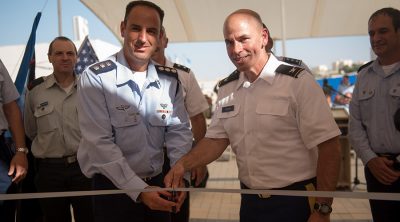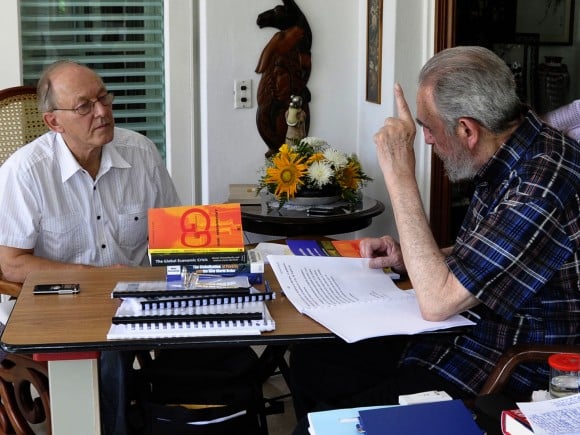US Opens First Permanent Military Base in Israel as Tensions with Iran Rise

Featured image: Israel Air Force Brig. Gen. Zvika Haimovich(L) with U.S. Army Maj. Gen. John Gronski(R) at the ground-breaking ceremony for the new permanent U.S. Army base in Israel (Source: Israel Defense Forces)
It will be a “base within a base,” located inside the Israeli Air Force’s Mashabim Air Base in the middle of the Negev desert, close to a US military radar installation east of Dimona that tracks ballistic missiles.
From the base, American forces will be helping operate Israel’s multi-tiered missile defense system, which the two countries developed together.
The base’s opening is largely symbolic and isn’t expected to bring operational changes, AP reported.
However, Israeli officials believe the establishment of the base will send a message to their enemies.
“This symbolizes the strong bond that exists between the United States and Israel.” – @MGGronskihttps://t.co/JyKN4mzVxT
— IDF (@IDFSpokesperson) September 18, 2017
“It’s a message that says Israel is better prepared. It’s a message that says Israel is improving the response to threats,” said Brig. Gen. Zvika Haimovich, the commander of Israel’s aerial defense.
In his speech, Maj. Gen. John Gronski, deputy commander of US Army National Guard in Europe, said the base “symbolizes the strong bond that exists between the United States and Israel.”
Such an honor to have my good friend, Israel PM @Netanyahu, join us w/ his delegation in NYC this afternoon. #UNGA https://t.co/YEHWjdtQx8 pic.twitter.com/jwU4e8Yk8A
— Donald J. Trump (@realDonaldTrump) September 18, 2017
Its opening coincides with Israel’s renewed push for the Trump administration to cancel what Israeli Prime Minister Benjamin Netanyahu called the “terrible” nuclear deal with Iran, whom Israel considers its biggest enemy.
The deal was negotiated by world powers, including the US, two years ago, to make sure Iran does not build nuclear weapons. The UN’s nuclear watchdog, the International Atomic Energy Agency, last week certified that Iran complied with the agreement.
However, earlier Monday, the Trump administration threatened to quit the deal if the IAEA does not require and obtain access to all Iranian military sites.
“We will not accept a weakly enforced or inadequately monitored deal,” Trump said in a statement to the watchdog’s annual meeting in Vienna.
On Sunday, Israeli intelligence chief Yossi Cohen was cited by Israel’s Channel 2 as calling for immediate action to ensure that Tehran cannot attain a nuclear bomb.
“Today’s Iran is the North Korea of yesterday, and so we need to act now so that we don’t wake up to [an Iranian] bomb,” Cohen reportedly said.
It was not immediately clear whether he called for a military strike against Iran.
The following day, an Iranian Army commander threatened to destroy Tel Aviv and Haifa if Israel makes “the tiniest” mistake of attacking Iran, according to Tasnim News Agency.
Israel’s multi-tier missile defense system includes the Arrow, designed to intercept long-range ballistic missiles – the kind that Iran has, Iron Dome, which defends against short-range rockets that were fired by Palestinian groups from the Gaza Strip, as well as David’s Sling which is designed to counter the type of medium-range missiles possessed by Iranian-backed Hezbollah militants.
The Globalization of War: America’s “Long War” against Humanity
by Michel Chossudovsky
The Globalization of War includes chapters on North Korea, Ukraine, Palestine, Libya, Iran, Yugoslavia, Haiti, Syria and Iraq as well as several chapters on the dangers of Nuclear War including Michel Chossudovsky’s Conversations with Fidel Castro entitled “Nuclear War and the Future of Humanity”.
According to Fidel: “in the case of a nuclear war, the ‘collateral damage’ would be the life of all humanity”.
The book concludes with two chapters focussing on “Reversing the Tide of War”.
“The Globalization of War” is diplomatic dynamite – and the fuse is burning rapidly.”
ISBN Number: 978-0-9737147-6-0
- Pages: 240 Pages
List Price: $22.95
Order directly from Global Research
Special Price: $15.00
 America’s hegemonic project in the post 9/11 era is the “Globalization of War” whereby the U.S.-NATO military machine —coupled with covert intelligence operations, economic sanctions and the thrust of “regime change”— is deployed in all major regions of the world. The threat of pre-emptive nuclear war is also used to black-mail countries into submission.
America’s hegemonic project in the post 9/11 era is the “Globalization of War” whereby the U.S.-NATO military machine —coupled with covert intelligence operations, economic sanctions and the thrust of “regime change”— is deployed in all major regions of the world. The threat of pre-emptive nuclear war is also used to black-mail countries into submission.
Conversations on the Dangers of Nuclear War: Fidel Castro and Michel Chossudovsky, Havana, October 2010
This “Long War against Humanity” is carried out at the height of the most serious economic crisis in modern history.
It is intimately related to a process of global financial restructuring, which has resulted in the collapse of national economies and the impoverishment of large sectors of the World population.
The ultimate objective is World conquest under the cloak of “human rights” and “Western democracy”.
Order directly from Global Research
REVIEWS:
“Professor Michel Chossudovsky is the most realistic of all foreign policy commentators. He is a model of integrity in analysis, his book provides an honest appraisal of the extreme danger that U.S. hegemonic neoconservatism poses to life on earth.”
Dr. Paul Craig Roberts, former Assistant Secretary of the U.S. Treasury
““The Globalization of War” comprises war on two fronts: those countries that can either be “bought” or destabilized. In other cases, insurrection, riots and wars are used to solicit U.S. military intervention. Michel Chossudovsky’s book is a must read for anyone who prefers peace and hope to perpetual war, death, dislocation and despair.”
Hon. Paul Hellyer, former Canadian Minister of National Defence
“Michel Chossudovsky describes globalization as a hegemonic weapon that empowers the financial elites and enslaves 99 percent of the world’s population.
“The Globalization of War” is diplomatic dynamite – and the fuse is burning rapidly.”
Michael Carmichael, President, the Planetary Movement
Michel Chossudovsky is an award-winning author, Professor of Economics, Founder and Director of the Centre for Research on Globalization (CRG)


